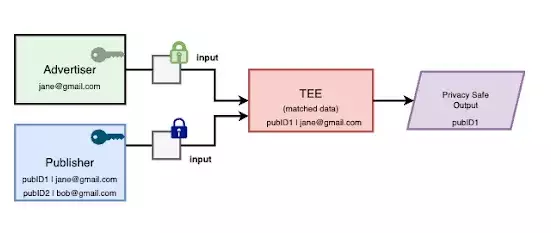In an era where privacy concerns are becoming increasingly prevalent, Google is striving to balance the delicate relationship between user privacy and effective ad targeting. Their innovative approach, known as “confidential matching,” is a step toward achieving this balance, leveraging secure technologies to enhance both data privacy and advertising effectiveness.
Confidential matching employs cutting-edge technologies called Trusted Execution Environments (TEEs), which allow for a secure analysis of data without exposing any sensitive information. By integrating businesses’ first-party data with Google’s insights, advertisers can target audiences more accurately without sacrificing user privacy. This method encrypts both data sets, ensuring that they remain confidential while still enabling businesses to leverage these insights for optimized ad campaigns.
This methodology shares similarities with data clean rooms, which provide controlled environments for data collaboration without revealing the raw data itself. Google emphasizes the importance of TEEs, stating that they isolate data processing, which safeguards against unauthorized access and manipulation, even by those with administrative privileges. This level of protection is crucial for maintaining trust in an industry increasingly scrutinized for its handling of personal data.
Google’s focus on privacy is not new, but rather a response to changing market demands and regulatory pressures. The tech giant faced significant setbacks as it attempted to phase out third-party cookie tracking on its Chrome browser—a transition originally slated for 2022. However, industry pushback and compliance requirements prompted Google to reevaluate its strategy, leading to the postponement of a widespread rollout in favor of alternatives that better align with evolving privacy norms.
The introduction of confidential matching demonstrates Google’s willingness to adapt to these challenges. The flexibility it offers—allowing businesses to encrypt data prior to its transfer—caters to companies with stringent data policies, fostering a sense of security in their data-sharing practices. This feature can enhance advertiser confidence while simultaneously addressing user concerns over data misuse.
For marketers, understanding the nuances of confidential matching is fundamental to harnessing its potential effectively. While the technical intricacies may be complex, the practical implications are clear—advertisers will have access to a more secure method for connecting with target audiences while minimizing the risk of data leaks. This alignment of privacy and effectiveness signifies a transformative shift in how businesses approach digital marketing.
By facilitating customer matching with built-in privacy features, Google is not just responding to contemporary challenges but is also paving the way for future advertising strategies. With confidential matching set as the default for data connections in Google Ads Data Manager, businesses are encouraged to consider how they can incorporate these new protocols into their marketing tactics, driving more informed, privacy-conscious campaigns.
The Path Forward
As Google pivots toward privacy-centric solutions like confidential matching, the question remains—will this approach suffice in the long term? While it appears to address pressing concerns regarding data usage, ongoing scrutiny from regulators and consumers alike will likely influence how these technologies evolve. Nevertheless, Google’s commitment to enhancing data privacy in advertising marks a significant stride in fostering a more secure digital marketing landscape, potentially setting a precedent for others in the industry to follow.


Leave a Reply
You must be logged in to post a comment.